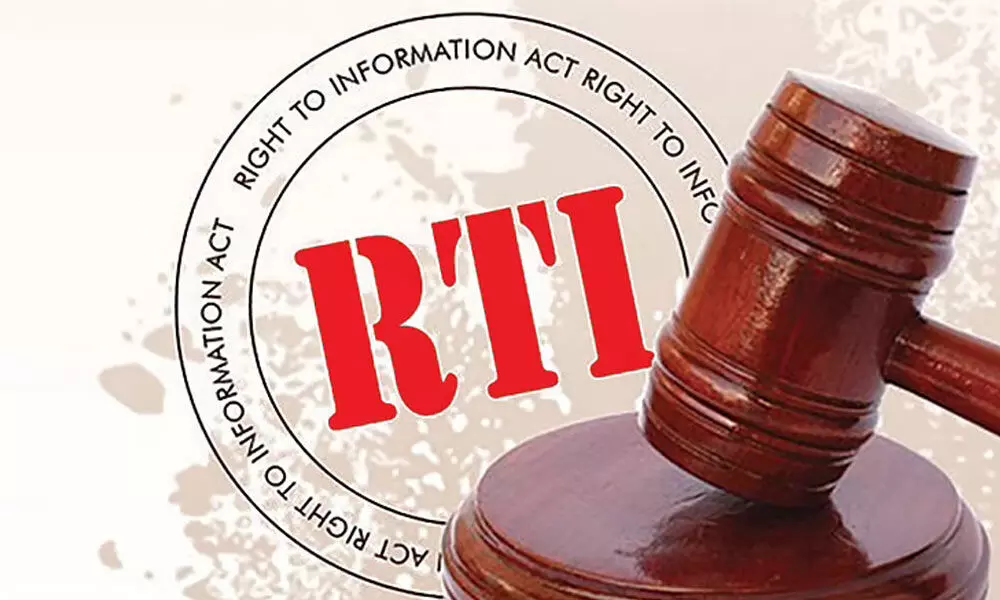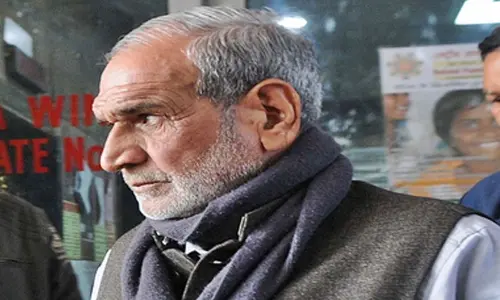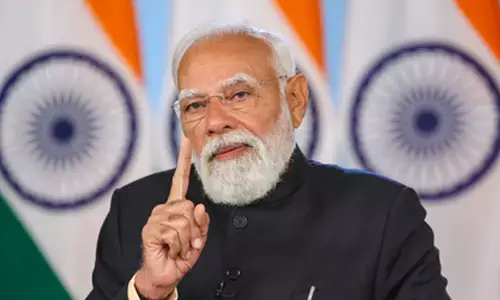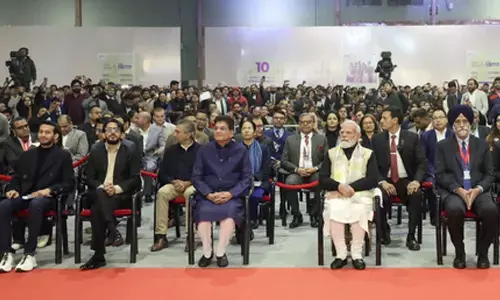Upholding 'secrecy' in Lok Pal selection

Upholding ‘secrecy’ in Lok Pal selection
The RTI Act and general ethics of administration demands the transparency about any selection or recruitment for public office
The RTI Act and general ethics of administration demands the transparency about any selection or recruitment for public office. The Department of Personnel and Training rules and Office Memoranda also guide the CPIOs to place entire record of recruitments and promotions and transfers in the public domain on their own.
Lok Palis an anti-corruption institution which is supposed to decide the legal action on complaints of abuse of authority for gain in a transparent manner. Though law was passed in 2013, the NDA Government could not appoint the Lok Pal and Lok Ayuktas since 2014 till recently. The high-level committee headed by the Prime Minister will appoint Lok Pal and others, which is expected to maintain the minutes of meetings that has to be in public domain as per law and rules.
But, according to CIC order dated January 28, the CPIO of DoPT has denied the minutes of the selection process of Lok Pal. Though CPIO did not invoke any 'exception', but his denial was upheld by CIC as valid. The CIC wrongly quotes the two Supreme Court judgements and gives order exactly opposite to SC orders.
The CIC cited SC order 15th Feb 2019 in Anjali Bharadwaj v Union of India which directed disclosure of all details of appointment of Information Commissioners which was complied with by DoPT. But it denied sharing the minutes of Lok Pal appointment which was made by almost similar Selection Committee.
Another case cited is: Common Cause A Registered Society vs. Ajay Mittal[Contempt PET.(C) No. 714/2018 in W.P.(C) No. 245/2014] relating to the constitution of the Lok pal, wherein the SC said: "…So far as the prayer for putting the names recommended by the Search Committee in the public domain is concerned, we have considered the provisions of Section 4(4) of the Act and it is our considered view that no direction from the Court should be issued in this regard. Rather the matter should be left for a just determination by the Selection Committee as and when the meeting of the Committee is convened."
A simple reading of Section 8(1)(b) would have been sufficient to know that disclosure of minutes was not prohibited by SC. Section 8(1)(b) says: information which has been expressly forbidden to be published by any court of law or tribunal or the disclosure of which may constitute contempt of court". This decision shows that Selection Committee if believes in transparency should decide to disclose. There is no prohibition imposed by SC.
Appellant Anjali said the contempt petition was filed when despite the court's 2017 ruling, the Centre failed to appoint a chairperson and members of the Lokpal. She pointed out that Section 4(4) of the Lok pal Act which states that the Selection Committee shall regulate its own procedure in a transparent manner for selecting the Chairperson and Members of the Lok pal.
The Central Information Commission has affixed its seal to non-disclosure of minutes of the anti-corruption body allowing secrecy in appointment process much against the letter and spirit of Right to Information Act and good governance rules.
Thus, selection process of Lok Pal is the 'secret' according to latest order of the CIC, most unfortunate. Secrecy breeds corruption. There are two tragedies: Lok Pal, which is expected to introduce transparency in all governance wings fights against transparency, the DoPT and CIC Saroj Punhani supports the secrecy.
Nowhere the order of CIC does support its conclusion that information sought 'confidential' 'secret' and 'fiduciary' in nature. One can find collegium conclusions in Supreme Court but not details of appointment of Lok Pal either from Lok Pal or DoPT. The CIC has simply listed the CPIO's illegal and illogical contentions and approved at the end, without giving any justification.
Anjali Bharadwaj has filed RTI application in November 2018 with the Department of Personnel and Training, seeking records related to the process of selection of the chairperson and members of the Lok pal.
Authorship: A new concept
The DoPT refused to provide a copy of the minutes of the meetings of the Selection Committee claiming the authorship of such documents which include 3-5 high level dignitaries does not vest in the Department of Personnel and Training and same have been shared as secret document. This raises fundamental question – who is the author of file of selection committee? It is neither poetry nor a story for someone to author it. Posts are advertised, applications are submitted, and selection committee conducts the process. None is author or owner of a file. Any file is built on application and ends with decision. Everyone who adds a comment is a contributor and each owns it. RTI recognizes holding the file not owning. And the DoPT which is nodal agency to implement RTI does not know it. Civil servants feel they are subordinate to DoPT and do not displease the boss.
The CIC has no jurisdiction or legal provision to examine the authorship of 'file' and deny it without referring to any clause of exception. The CIC's judgment is a shock to RTI activists as it laid down a new precedent of rejecting the appeal though no exception is attracted.
Sealed cover: Sealing transparency
The CPIO thought that confidentiality of the said record can be gauged by the fact that the averred minutes of the Selection Committee were received in a sealed cover by the DoPT and that it had been presented before the Supreme Court too in a sealed cover. The CIC did not explain who and why the minutes was categorised as 'secret' and on what grounds? Is it CIC's new concept that sealing the cover itself is 'secrecy' and every post and courier that goes in sealed cover, should never be opened?
The Commissioner understood that the information belonged to Lok Pal and thus it was 'third' party information with DoPT, which was given in sealed cover. Perhaps CIC assumes that anything given in sealed cover is 'top secret'. It is a clear misuse of third-party provision as 'exception' though there are several judicial pronouncements that information could be denied only under Sections 8 and 9 of RTI Act.
It also exposed the CPIO's knowledge of RTI, who thinks that consent of third party is needed. If that is so, why did he not consult Lok Pal, who might have consented for disclosure. It is pathetic that CPIO and first appellate authority of DoPT thinks that because third party is 'higher level" committee, the information should be totally 'secret'. The CIC did not bother to ask CPIO why he did not pursue the process of consulting third party. From CPIO of DoPT to CIC, an independent authority, they go by their own sense of transparency ignoring the RTI Act completely.
When cabinet decisions are disclosable along with entire material after decision was taken, how can any other body be considered as 'high level authority'? Is that committee higher in level than the cabinet? How the 'level' of authority prevents the disclosability? The CIC should have answered these questions.
Another wonderful idea of CPIO of DoPT floated was that minutes of a decision-making committee 'is holding it in fiduciary in nature' and hence should be denied. The CIC did not find it unreasonable and did not give any reasons.
The Government was never ready to constitute the Lok pal, though Act was passed in 2013. Even after the SC direction, the process did not begin. Only after contempt petition was pressed, the Selection Committee met. The Committee consists of the Prime Minister (Chairperson), Speaker of the House of the People, the Leader of Opposition in the Lok Sabha, the Chief Justice of India, or a Judge of the Supreme Court nominated by CJI and an eminent jurist, as recommended by the Chairperson and other members. As none was recognised as the Leader of Opposition (LoP) in the Lok Sabha after the 2014 elections, Committee met without the LoP and selected the Chair and other members of Lok Pal in 2019. The CIC, sadly, agreed with DoPT and Lok Pal in denying the information without reasoned application of any exception.
(The writer is Professor of Law, Bennett University and former Central Information Commissioner)














